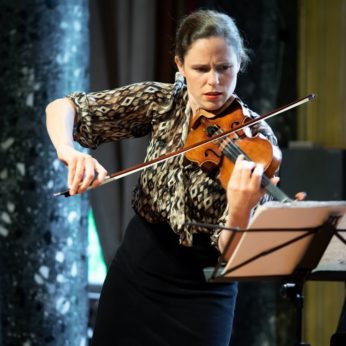Composer: Ernest Bloch (b. 1880 - d. 1959)
Performance date: 01/07/2018
Venue: Bantry Library
Composition Year: 1920
Duration: 00:17:18
Recording Engineer: Tom Norton, RTÉ
Instrumentation: 2vn, va, vc, pf
Instrumentation Category:Duo
Artists:
Nurit Stark -
[violin]
Cédric Pescia -
[piano]

Ernest
Bloch was a Swiss composer, born in Geneva, who spent most of his life in the
USA and, indeed, took out American citizenship. He is perhaps best-known for
his explorations of his Jewish heritage. In his lifetime he was much feted as a
composer, conductor and teacher. The violin was Bloch’s instrument and he
seemed destined to be a professional performer, but was encouraged by his
teacher, Eugène Ysaÿe, to become a composer. His First Violin Sonata was begun
in New York and completed in Cleveland where he had gone to be Director of
their new Institute of Music. He was hugely successful in establishing the
Institute, where he remained for five years.
Bloch
described his First Violin Sonata as the
world as it is: the frantic struggle of blind and primordial forces. His
Second Sonata Poème Mystique, which
this evening’s performers played for us in the 2016 Festival, was the world as it should be: the world of
which we dream; a work full of idealism, faith, fervour, hope. The First
Sonata was written in the aftermath of World War 1 so no holds are barred in
the first ferocious movement. This opens with extraordinary violence as Bloch
sets out to give us the feeling of the atmosphere
of battle with a ritualistic motif from the violin accompanied by cross
rhythms in the piano. The second subject is in complete contrast, a dream-like
and romantic idea that meets a brutal closure when trench warfare resumes. Marrying
two such dramatically opposed ideas makes for powerful contrasts in the
development and recapitulation, quite apart from the huge demands on the
performers’ virtuosity.
The
second molto quieto movement was a
response to his readings on Tibetan Buddhism. It begins very gently with muted
violin but gradually builds to a spectacular outburst of emotion. This slowly
abates to a point of stillness followed by the chiming of Tibetan bells
from the piano. A strange passage of tremolo pizzicato leads back into a very
un-Tibetan outpouring of Romantic passion and climactic joy and a long,
delicious fade. Bloch described the final movement as a barbaric march – a vision of an angry, pitiless, primitive
deity. An early critic reacted as follows:
The violence and automatism of the first movement,
coupled with the eastern motive of renunciation and expiation in the second,
seem to have unconsciously led Bloch’s mind, in the Finale, to a realistic and
merciless yet symbolic illustration of this insensate doom of man. Here it is
decreed by ancient conquerors and priests in a scene of dark savagery and
sacrifice in some heartless rite of the childhood of the world.
Copyright © 2025 West Cork Music. All rights reserved.
Designed and developed by Matrix Internet